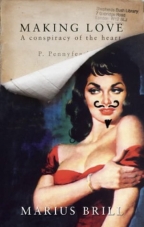Making Love: A conspiracy of the heart
Doubleday/Transworld Publishers
UK Hardcover First
ISBN: 0-385-60523-4
Publication Date: May, 2003
464 Pages; £12.99
Date Reviewed: August 13, 2003
Reviewed by: Terry D'Auray © 2003
|

|
|
REFERENCES
|
COLUMNS
|
|
General
Fiction, Fantasy,
Mystery,
Science
Fiction
|
|
Radio drama writer, prize-winning playwright and film writer
Marius Brill is generating a buzz in Britain with his sexy, comedic
first novel, 'Making Love A Conspiracy of the Heart'. It is an
inventive, often hilarious parody of spy-thrillers, conspiracy
theories and old-fashioned heart fluttering romantic novels.
'Making Love' is a book about a library book that falls in love
with its reader - as told by the book itself. No ordinary book, this
one is so filled with dangerous truths about love and sex that the
British M15 had it destroyed. The sole remaining copy of the book is
filed ignobly midst the romances in seedy Shepherds Bush Library,
London. Miranda steals the book from the library by hiding it in her
bra - no wonder the book fell instantly in love. A shop girl who
sells sanitary napkins by day, Miranda escapes boredom and loneliness
by reading romances by night. Alarmed that this heretical book still
exists, M15 reopens the "Love Nuts" operation and calls in superstud
agent Burnt Umber/Ferdinand. Umber's job - to "break or stop"
Miranda's heart and recover the book. Thus begins a wildly
improbable, sexy, silly and highly enjoyable romp.
The cast of characters is small, but each one is introduced in
full regalia, their foibles and foolishness nailed with precision and
riotous humor. Tony Fromnextdoor, secret computer hacker and secretly
in love with Miranda; Barry in Dispatch, "over jerked and underlaid";
Mercy Bradley, Miranda's "sex on a stick" co-worker and best friend.
There's Matthew Flirt, who risks life and limb (literally, and often)
to aid Miranda and Mercy; Boss Scrufstayn, who enjoys his "Thursday
Night Surprise" S&M adventures; bookish and fey Peesnide
(Trotsky), book thief turned agent. And the romantic hero, Agent
Burnt Umber, aka Ferdinand, tall, dark and handsome, whose character
is "borrowed and overdue". These characters audaciously strut their
stuff in scene after improbable scene. Scenes that would be oafish or
overly broad on film, simply sight gag funny, are more substantive
and far funnier when told in Brill's prose. Pictures sometimes aren't
worth a thousand words, particularly if they're Brill's words.
The most arresting character in this book, the star of the show,
is "the book" himself (he's clearly, lustily, masculine), a true
romantic, yearning for love rather than a "quick fondle in these
sheets". While telling Miranda's tale, he often wanders a field,
speculating on this and that, describing the world from a book's
viewpoint. "A book can go anywhere...the metaphysical equivalent of
an all-zone travel card." "One of the perks of being a book" is that
"you always know the ending". Aware that he's lost Miranda's love to
Ferdinand, he frequently steps aside and attempts to woo a new
lover...the current reader. Beware. He's not easily denied.
Pennyfeather is the book's author and his heretical text is
interspersed with the story of Miranda. Set in a clunky typeface that
is both hard to read and intimidating, Pennyfeather's metaphysical
speculations and theories are ponderous, but witty and, often,
wonderful.
In Brill's world, everything is funny - politics, philosophy,
social mores, reality, fantasy, animals, and particularly people. He
writes a full gamut of humorous styles - cynical, silly, witty,
clever, absurd, situational, scatological. Mixing simple puns with
sophisticated word play, he's chatty and loquacious, taking the world
and turning it 180-degrees off kilter. Part Monty Python, part Jaspar
Fforde, part Woody Allen, with a wit all his own, if you love words,
you'll love what Brill does with them.
Not to be overlooked midst all the humor is the story itself, a
study in contrasts. Miranda's romantic love story versus
Pennyfeather's "love is the by-product of biological urges" treatise.
Suave Ferdinand versus crude Barry, effete Peersnide versus manly
Matthew, self-deprecating eager-for-love Miranda versus
self-aggrandizing man-hater Mercy. "Making Love' is ultimately the
contrast between a fairy tale and a love story, between love and
lust, romance and sex, farce and fantasy.
If I find a fault with this book, it's simply that it's too long.
Although it moves from gently paced love story to mad action-packed
thriller with "verbs a go-go", I grew accustomed to the language,
inured to the wit, and ultimately, eager for an end. There is too
much of a good thing. But I laughed out loud, and happily surrendered
to the farce and fantasy. I "had text" and fell in love with 'Making
Love'. I suspect you will too.
